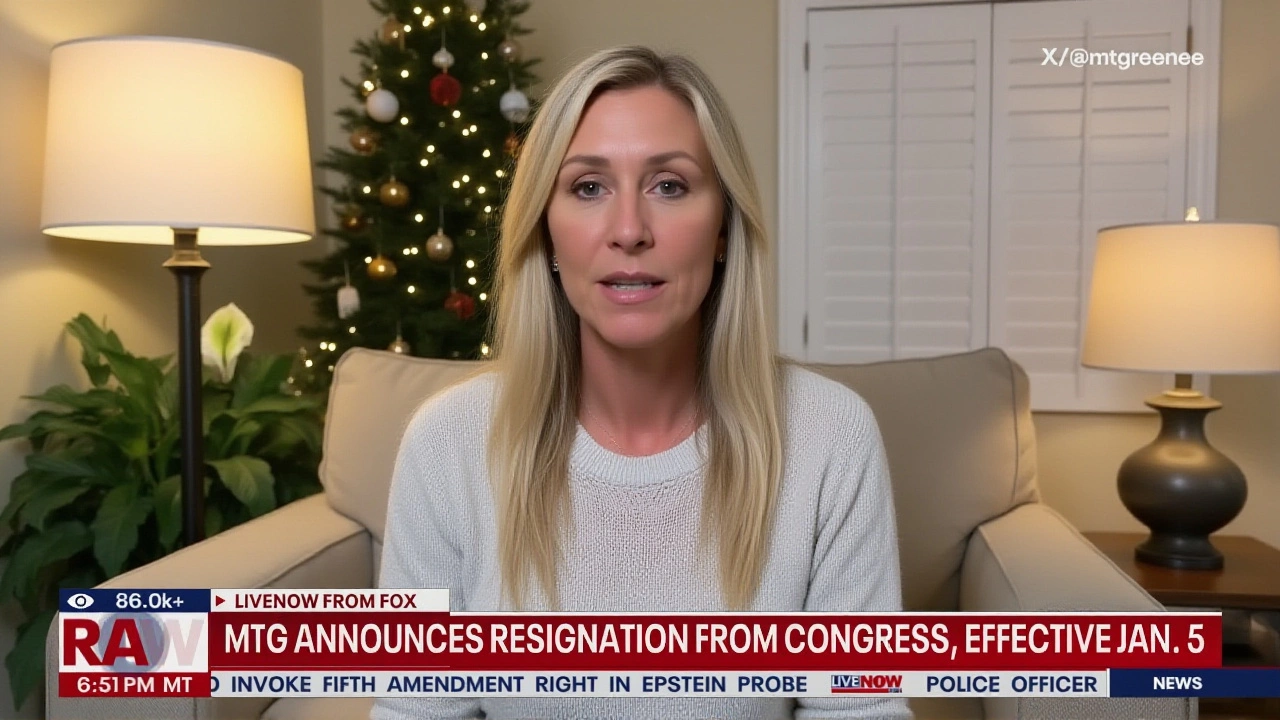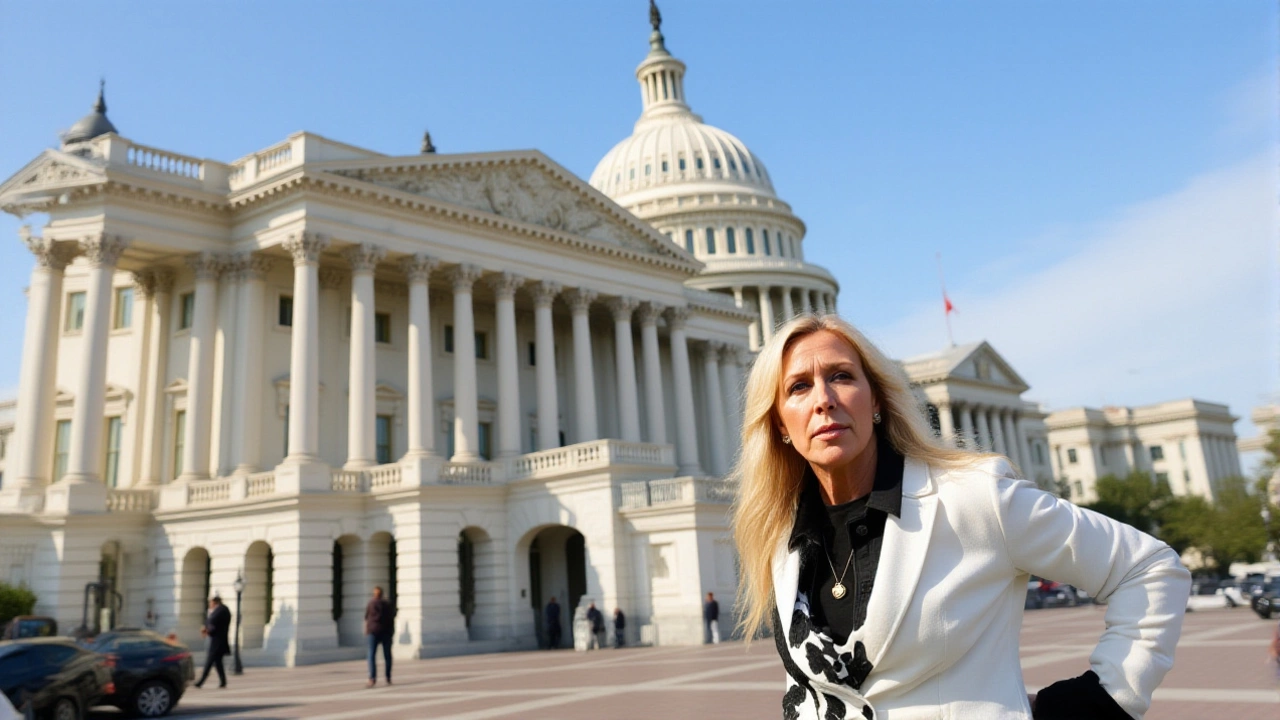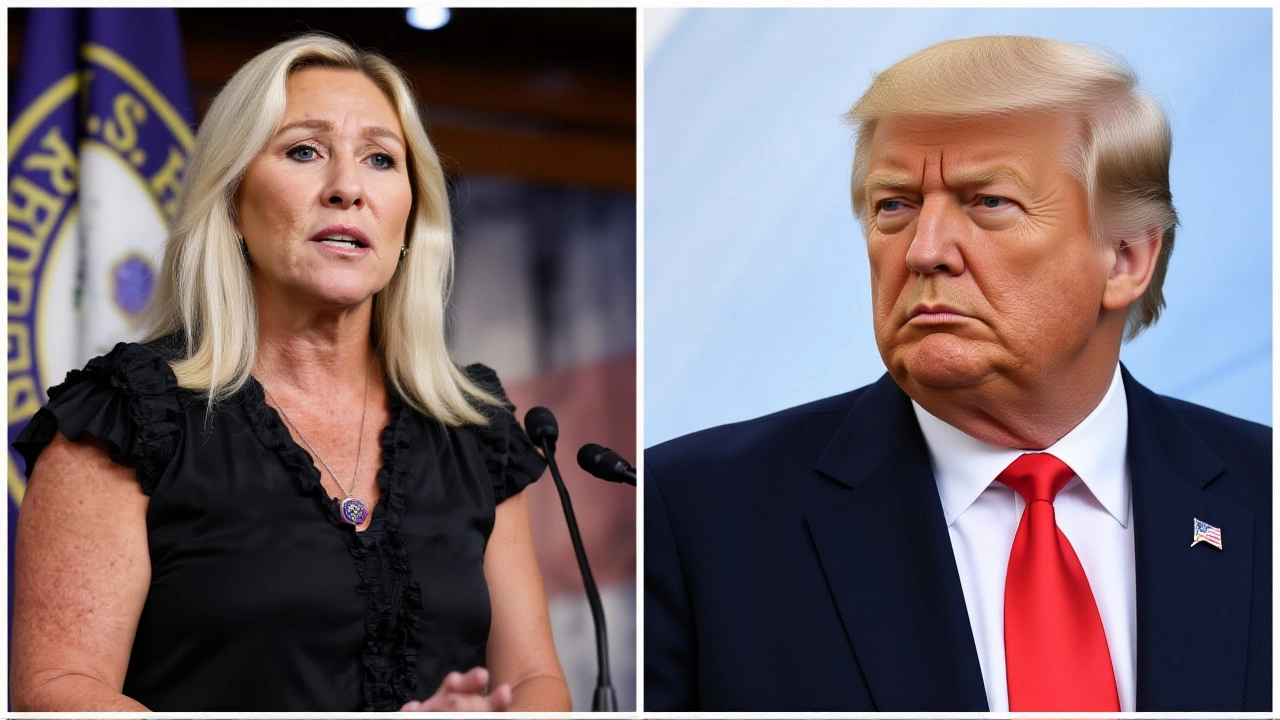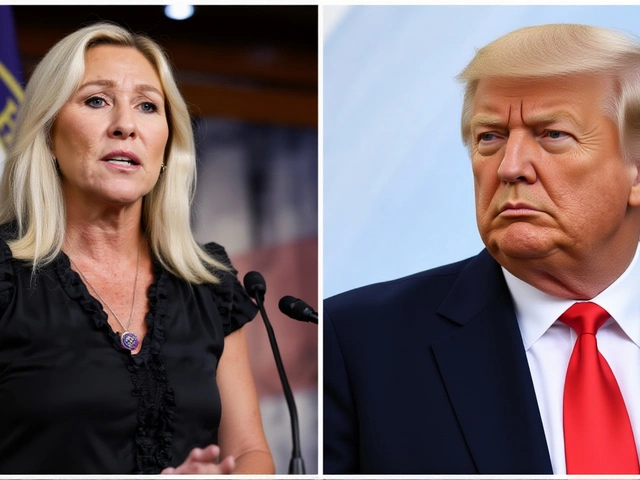Just days after former President Donald J. Trump publicly unendorsed her, Marjorie Taylor Greene, the fiery Republican representative from Georgia's 14th congressional district, announced her resignation from Congress effective January 3, 2026. The move, delivered in a tearful video on Friday, November 21, 2025, stunned even her most ardent allies — and especially Trump, who claimed she quit because she "wouldn't have won her primary" after he threatened to back a challenger. But Greene’s version tells a different story: "I have too much self-respect and dignity... I do not want my sweet district to have to endure a hurtful and hateful primary against me by the president that we all fought for."
The Fallout from a Fractured Alliance
Greene, 49, was once among Trump’s most loyal congressional allies, a vocal defender of his agenda since her 2020 landslide win with 74.3% of the vote. But over the past three weeks, the relationship unraveled. The breaking point? The release of newly unsealed Jeffrey Epstein files, which Greene publicly criticized as being selectively leaked to damage Trump’s political standing. She also clashed with him on healthcare reform and U.S. involvement in foreign conflicts, particularly in the Middle East. Trump, in turn, called her "a traitor and wacky" on Truth Social, and on November 14, 2025, he officially withdrew his endorsement during a rally in Macon, Georgia, accusing her of having "lost the spirit" of the movement. The tension peaked when Trump, during an impromptu press briefing outside the White House residence on Saturday, November 22, 2025, suggested Greene’s resignation was a preemptive strike to avoid a primary fight he was preparing to fund. "She wouldn’t have won," he told reporters at 1600 Pennsylvania Avenue NW. "Frankly, I don’t think anybody cares about her." His comments drew immediate backlash from both sides of the aisle — and from Greene’s own constituents.Greene’s Final Words and Political Calculus
Greene’s resignation video, recorded in her district office near Rome, Georgia, was carefully crafted. She didn’t mention Trump by name — but the subtext was unmistakable. She spoke of protecting her family, of preserving her dignity, and of refusing to become a pawn in a political war. "I love my district too much to let it be torn apart," she said. Her prediction — that Republicans would lose the 2026 midterms — was as much a warning as it was a lament. Her decision to step down now, rather than wait for the 2026 election, is a strategic one. With Trump’s endorsement gone, polls in the district — which Trump won by 75.8% in 2020 — showed her support slipping into the low 60s. A primary challenge backed by Trump-aligned super PACs would have been brutal, expensive, and divisive. By resigning, Greene avoids a messy fight and retains control over her legacy.
Washington’s Surprise and the Coming Special Election
House Speaker Mike Johnson, the Louisiana Republican who leads the House, told NBC News he was "caught completely by surprise." His office scrambled to assess the fallout. The vacancy triggers a special election under Georgia law, likely to be held in March 2026. Governor Brian P. Kemp, who’s held office since 2019, will call the election — and his team is already vetting potential candidates. The district — stretching from the Appalachian foothills near Dalton to the northern exurbs of Atlanta — is a Republican stronghold, but it’s also home to a growing number of suburban independents. The winner of the special election will face a tough re-election bid in November 2026, when voters will be deciding not just local issues, but whether they still trust the Trump-aligned GOP.What This Means for the GOP
This isn’t just about one representative leaving office. It’s about the unraveling of the Trump coalition’s internal cohesion. Greene represented the raw, unfiltered wing of the party — the base that turned out in droves for Trump in 2016 and 2020. Her departure signals that even his most loyal allies are now wary of his wrath. The message to other Republicans? Align too closely with Trump, and you’re protected. Challenge him, even quietly, and you’re targeted. Meanwhile, moderate Republicans in Georgia are breathing a sigh of relief. They’ve long feared Greene’s brand of politics would turn off suburban voters. But they also worry that Trump’s retaliation tactics could destabilize the party’s grip on the district — and the state.
What Comes Next
The special election in March 2026 will be the first major test of Trump’s enduring influence outside of rallies. Will his endorsed candidate win with 70%? Or will a more mainstream Republican — perhaps a former state legislator or local business owner — capitalize on voter fatigue? Either way, the race will be closely watched by national operatives. Greene’s resignation also raises questions about the future of the Republican Party’s identity. Is it still the party of Trump’s unapologetic populism? Or is it shifting toward a more electable, less combative model? The answer may come sooner than anyone expects.Frequently Asked Questions
Why did Marjorie Taylor Greene resign now instead of waiting for the 2026 election?
Greene resigned to avoid a potentially devastating primary challenge backed by Donald Trump and his allies. Polls showed her support slipping, and a Trump-funded opponent would have forced her into a bitter, expensive fight. By stepping down now, she retains control over her narrative and avoids alienating her base in a public battle.
How did Donald Trump respond to Greene’s resignation?
Trump claimed Greene resigned because she "wouldn’t have won her primary" after he threatened to fund a challenger. He called her a "traitor" and dismissed her significance, saying, "Frankly, I don’t think anybody cares about her." His comments, made during a White House press briefing, were widely seen as a final public rebuke.
What impact will this have on Georgia’s 14th congressional district?
The district, which includes Rome and parts of the Atlanta metro’s northern exurbs, remains a Republican stronghold, but Trump’s involvement has polarized voters. A special election in March 2026 will test whether Trump’s base still dominates — or if moderates can capitalize on voter fatigue. The winner will face a tough re-election in November 2026 amid national midterm dynamics.
What led to the breakdown between Greene and Trump?
The rift grew over three weeks, fueled by disagreements over the release of Jeffrey Epstein files, healthcare policy, and foreign policy stances. Greene criticized Trump’s handling of the Epstein documents as politically motivated, while Trump accused her of betraying the movement. His public unendorsement on November 14, 2025, was the final break.
Who will replace Marjorie Taylor Greene in Congress?
A special election, likely in March 2026, will determine her successor. Georgia Governor Brian Kemp will set the date. Potential candidates include state legislators, local business owners, and Trump-aligned figures. The winner will serve the remainder of Greene’s term and must run again in November 2026 for a full term.
Is this a sign that Trump’s grip on the GOP is weakening?
It’s a sign of his influence — and its cost. Greene’s resignation shows Trump can still force out even his closest allies. But it also reveals growing unease among Republicans who fear his tactics are alienating suburban voters. The GOP now faces a choice: double down on Trump’s brand, or pivot toward candidates who can win broader appeal.

